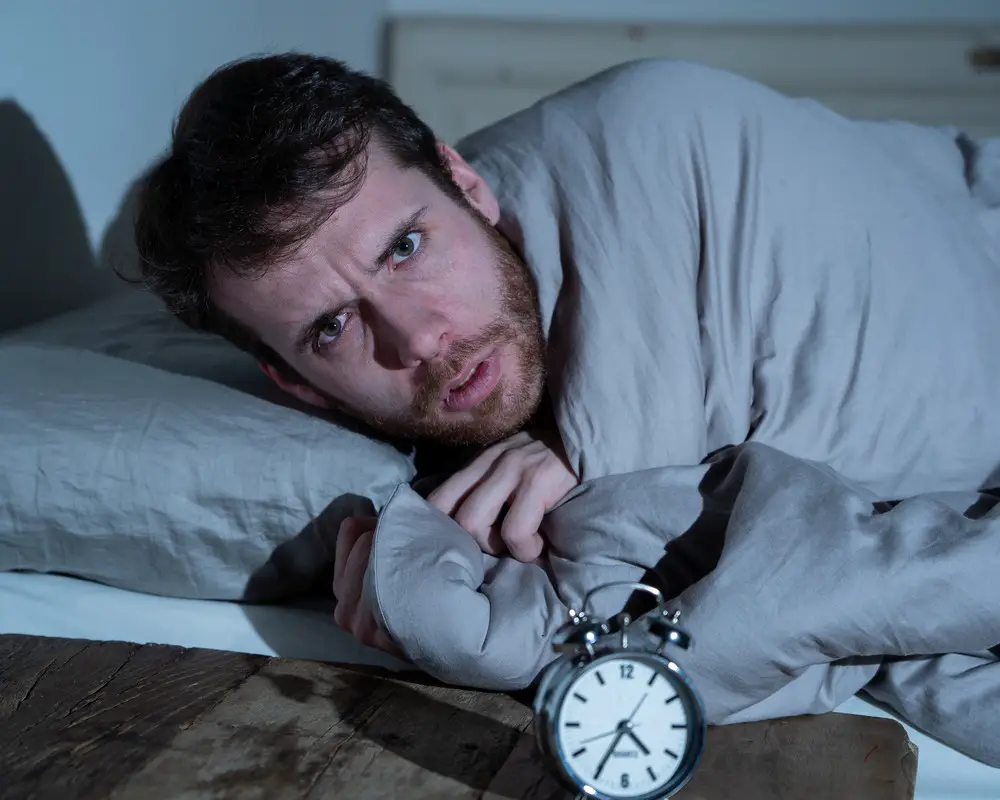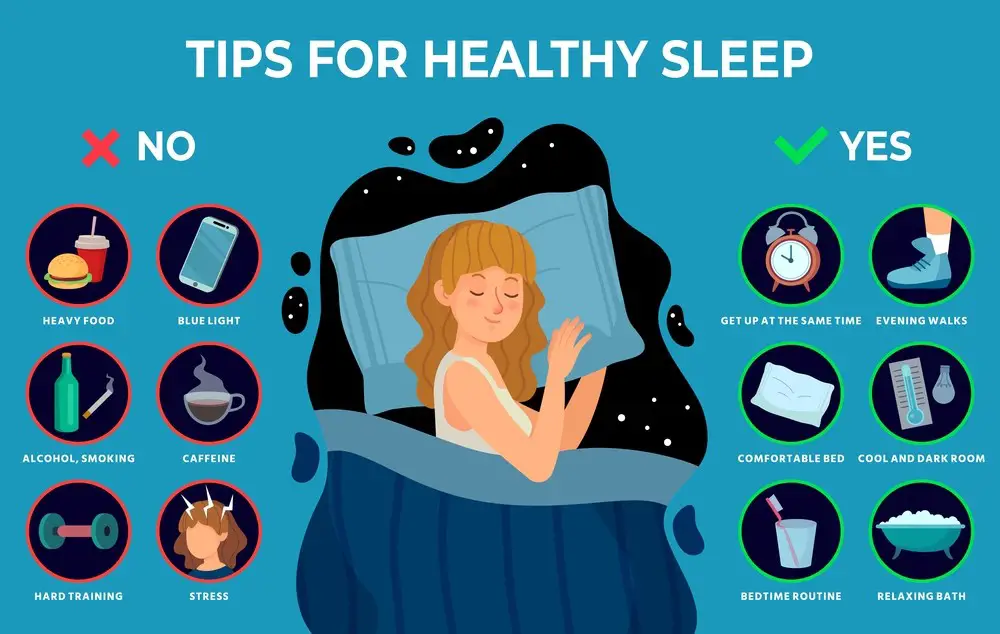As a BetterHelp affiliate, we receive compensation from BetterHelp if you purchase products or services through the links provided
Are you tired of being tired? You’re not alone if you find it challenging to drift off to dreamland or stay there. We’ve all had sleepless nights, but it’s time to take action when they become the norm rather than the exception. To help you kick those sleepless nights to the curb, we’ve gathered expert tips on how to sleep better, deeper, and longer. These aren’t just run-of-the-mill tips; they come from sleep therapists, CEOs, and lifestyle experts who have cracked the code to a blissful night’s sleep. From seated meditation to ambient noise, there’s something for everyone to create their personalized sleep sanctuary. Ready to dive in?
- Embrace a Seated Meditation Before Bed
- Manage Stress Levels
- Turn Off Electronics Before Bedtime
- Experience Better Sleep with Scented Sheets
- Incorporate Chamomile Tea into Your Nighttime Routine
- Combine Hot Shower with Light Exercises
- Use Ambient Noise
- Limit Daytime Naps
- Exercise Regularly
- Establish Consistent Bedtime Routine
 Embrace a Seated Meditation Before Bed
Embrace a Seated Meditation Before Bed
 Adding a seated meditation routine right before bed has helped improve my sleep. From my background in psychology and mindfulness, I’ve come to understand the profound impact of being able to calm the mind. I dedicate 10-15 minutes to sitting in a quiet space each night, focusing solely on my breath. This practice allows me to transition from the day’s agitation to inner tranquility gently.
Adding a seated meditation routine right before bed has helped improve my sleep. From my background in psychology and mindfulness, I’ve come to understand the profound impact of being able to calm the mind. I dedicate 10-15 minutes to sitting in a quiet space each night, focusing solely on my breath. This practice allows me to transition from the day’s agitation to inner tranquility gently.
Observing my thoughts without attachment or becoming overly involved creates a mental environment conducive to deep rest. Over time, I’ve noticed a significant improvement in the time it takes to fall asleep and the depth and quality of my sleep.
Bayu Prihandito, Psychology Expert, Life Coach, Founder, Life Architekture

Manage Stress Levels
A key tactic for improved sleep is managing stress levels through exercise, meditation, gratitude journaling, developing a morning and bedtime routine, limiting smartphone time, and pausing throughout the day. This allows us to bring our cortisol levels down throughout the day to gradually release melatonin and support the physiological processes necessary for sleep.
If our cortisol levels are too high, we cannot produce sufficient melatonin to induce and maintain sleep throughout the night. Maintaining a healthy circadian rhythm is also important for managing our stress levels and in regulating our sleep-wake cycle.
Donna Helliwell, Sleep Therapist and Consultant, Design Your Sleep
Turn Off Electronics Before Bedtime
 I realized that shutting off electronic devices, like my phone and TV, about an hour before hitting the sack made a vast difference in my sleep. The light from these screens can keep our minds active, making it hard to wind down.
I realized that shutting off electronic devices, like my phone and TV, about an hour before hitting the sack made a vast difference in my sleep. The light from these screens can keep our minds active, making it hard to wind down.
Switching them off earlier allows my brain to chill and prepare for a good night’s rest. This small tweak in my nightly routine has helped me fall asleep quicker, enjoy a deeper sleep, and wake up feeling more energized and ready for the day.
Khurram Mir, Founder and Chief Marketing Officer, Kualitatem Inc.
 Experience Better Sleep with Scented Sheets
Experience Better Sleep with Scented Sheets
It’s a really simple thing, but the one thing I’ve found that helps me sleep better, deeper and longer is scented sheets. I wash my sheets and use a gentle, lavender-scented fabric softener. Lavender induces sleep; smelling it on my sheets as I rest helps me relax.
Being able to relax helps me sleep faster and, overall, better. I change my sheets more often to keep the scent active. I change them twice a week, which has helped me over the past few months.
Michael Gorlovsky, Orthodontist, Windermere Orthodontics
Incorporate Chamomile Tea into Your Nighttime Routine
 Navigating the entrepreneurial hustle often leads to compromised sleep. As an entrepreneur, the challenges of balancing work and rest are understood. One effective tactic that has been personally embraced is incorporating chamomile tea into the nighttime routine.
Navigating the entrepreneurial hustle often leads to compromised sleep. As an entrepreneur, the challenges of balancing work and rest are understood. One effective tactic that has been personally embraced is incorporating chamomile tea into the nighttime routine.
Chamomile tea, known for its calming properties, has been a soothing remedy for achieving better sleep. The natural compound apigenin in chamomile binds to brain receptors associated with sleepiness and relaxation. This makes it an ideal choice for winding down after a demanding day.
Amid entrepreneurship, where sleep quality can suffer, chamomile tea has become a tranquil anchor. Sipping a warm cup in the evening helps signal the body that it’s time to relax and prepare for rest. This simple ritual promotes better sleep and provides a moment of serenity amidst the bustling entrepreneurial journey.
Sonu Bubna, Founder, Shopper.com
Combine a Hot Shower with Light Exercises
 Recently, I have found that taking a hot shower before sleep is an effective tactic for helping me sleep better and longer. The warmth of the water and the relaxing nature of standing in the shower help reduce my body temperature, lower my heart rate, and relax my muscles to prepare me for restful sleep.
Recently, I have found that taking a hot shower before sleep is an effective tactic for helping me sleep better and longer. The warmth of the water and the relaxing nature of standing in the shower help reduce my body temperature, lower my heart rate, and relax my muscles to prepare me for restful sleep.
This tactic has been commonly used, but coupling it with light stretching or yoga exercises is often forgotten. Doing this extra step further helps to loosen up tight muscles while calming the mind before entering into those deep stages of sleep. Combined elements make it easier to drift off peacefully and make it more likely that I’ll remain asleep until morning.
Kate Duske, Editor-in-Chief, Escape Room Data
Use Ambient Noise
 I use a variety of different ambient noise tracks while I sleep. This is a common approach for very young children. Despite my age, I find it quite useful. A big part of this is the dense, urban area where I live. Even with decent noise-proofing and a quieter, mostly residential street, inevitable loud noises are coming everywhere.
I use a variety of different ambient noise tracks while I sleep. This is a common approach for very young children. Despite my age, I find it quite useful. A big part of this is the dense, urban area where I live. Even with decent noise-proofing and a quieter, mostly residential street, inevitable loud noises are coming everywhere.
Trevor Ewen, COO, QBench
Limit Daytime Naps
 If you sleep in the daytime, you cannot sleep longer at night, so limiting daytime naps is better. While brief naps are helpful, long or inconsistent daytime napping can disrupt nighttime sleep. If you nap, keep it short, preferably earlier in the day. This strategy helps maintain a consistent sleep schedule, leading to deeper and longer sleep at night.
If you sleep in the daytime, you cannot sleep longer at night, so limiting daytime naps is better. While brief naps are helpful, long or inconsistent daytime napping can disrupt nighttime sleep. If you nap, keep it short, preferably earlier in the day. This strategy helps maintain a consistent sleep schedule, leading to deeper and longer sleep at night.
James McNally, Managing Director, SDVH [Self Drive Vehicle Hire]
Exercise Regularly
 Exercise is essential for getting a good night’s sleep, as it helps to relax the body and mind. When you exercise regularly, your body gets used to the physical exertion, which can help you fall asleep faster and sleep more deeply throughout the night.
Exercise is essential for getting a good night’s sleep, as it helps to relax the body and mind. When you exercise regularly, your body gets used to the physical exertion, which can help you fall asleep faster and sleep more deeply throughout the night.
Additionally, regular exercise increases serotonin levels in the brain, which has been shown to help regulate sleep and promote relaxation. If you’re having trouble sleeping, make sure to get some exercise during the day for a better night of rest.
Evan Tunis, President, Florida Healthcare Insurance
Establish a Consistent Bedtime Routine
 One effective tactic for improved sleep quality is establishing a consistent bedtime routine. This involves winding down with calming activities, such as reading a book, practicing deep breathing, or taking a warm bath before sleep.
One effective tactic for improved sleep quality is establishing a consistent bedtime routine. This involves winding down with calming activities, such as reading a book, practicing deep breathing, or taking a warm bath before sleep.
This routine signals to your body that it’s time to relax and prepares it for sleep. Consistency reinforces your body’s internal clock, optimizing sleep patterns over time.
This tactic is effective as it minimizes sleep disturbances and enhances the transition from wakefulness to slumber. It creates a mental and physical environment conducive to relaxation, ultimately promoting deeper and more restful sleep.
Aviad Faruz, CEO, Know Mastery
 When Sleepless Nights Turn into Restless Lives: Signs It’s Time to Seek Help
When Sleepless Nights Turn into Restless Lives: Signs It’s Time to Seek Help
If you’ve diligently tried implementing these tactics but still toss and turn each night, it may be time to consider professional help. Constant sleep deprivation isn’t just a nighttime issue; it seeps into your daytime life, affecting your mood, energy, and overall well-being.
If you’re experiencing persistent insomnia, extreme fatigue during the day, or frequent awakenings throughout the night, these could be signals that a deeper issue is at play. Another red flag is whether sleep deprivation interferes with work, relationships, or mental health.
So don’t neglect the signs. Take action and reclaim the restful nights you deserve.
- Stress Management: What is the Relationship Between Stress and Addiction? - June 28, 2024
- Exploring Techniques to Maintain a Healthy Lifestyle without Drugs - May 28, 2024
- How Acupuncture Helps Treat Chronic Fatigue Syndrome - May 28, 2024
This site contains affiliate links to products. We will receive a commission for purchases made through these links.


 Embrace a Seated Meditation Before Bed
Embrace a Seated Meditation Before Bed Experience Better Sleep with Scented Sheets
Experience Better Sleep with Scented Sheets When Sleepless Nights Turn into Restless Lives: Signs It’s Time to Seek Help
When Sleepless Nights Turn into Restless Lives: Signs It’s Time to Seek Help

